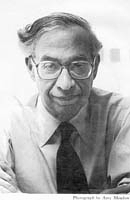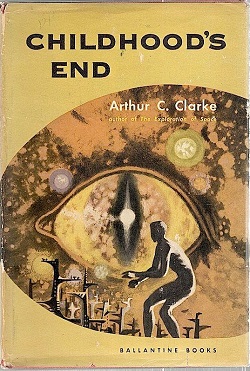
Donald Allen Wollheim was an American science fiction editor, publisher, writer, and fan. As an author, he published under his own name as well as under pseudonyms, including David Grinnell, Martin Pearson, and Darrell G. Raynor. A founding member of the Futurians, he was a leading influence on science fiction development and fandom in the 20th-century United States. Ursula K. Le Guin called Wollheim "the tough, reliable editor of Ace Books, in the Late Pulpalignean Era, 1966 and '67", which is when he published her first two novels in Ace Double editions.

Herbert George Wells was an English writer. Prolific in many genres, he wrote more than fifty novels and dozens of short stories. His non-fiction output included works of social commentary, politics, history, popular science, satire, biography, and autobiography. Wells' science fiction novels are so well regarded that he has been called the "father of science fiction".
Pulp magazines were inexpensive fiction magazines that were published from 1896 through the 1960s. The term "pulp" derives from the cheap wood pulp paper on which the magazines were printed. In contrast, magazines printed on higher-quality paper were called "glossies" or "slicks". The typical pulp magazine had 128 pages; it was 7 inches (18 cm) wide by 10 inches (25 cm) high, and 0.5 inches (1.3 cm) thick, with ragged, untrimmed edges. Pulps were the successors to the penny dreadfuls, dime novels, and short-fiction magazines of the 19th century.

Childhood's End is a 1953 science fiction novel by the British author Arthur C. Clarke. The story follows the peaceful alien invasion of Earth by the mysterious Overlords, whose arrival begins decades of apparent utopia under indirect alien rule, at the cost of human identity and culture.

Canadian literature is the literature of a multicultural country, written in languages including Canadian English, Canadian French, and Indigenous languages. Influences on Canadian writers are broad both geographically and historically, representing Canada's diversity in culture and region.
This article contains information about the literary events and publications of 1920.
Events from the year 1953 in literature .
This article contains information about the literary events and publications of 1955.
Ian R. MacLeod is a British science fiction and fantasy writer.
Lewis Padgett was the joint pseudonym of the science fiction authors and spouses Henry Kuttner and C. L. Moore, taken from their mothers' maiden names. They also used the pseudonyms Lawrence O'Donnell and C. H. Liddell, as well as collaborating under their own names.

Ace Books is a publisher of science fiction (SF) and fantasy books founded in New York City in 1952 by Aaron A. Wyn. It began as a genre publisher of mysteries and westerns, and soon branched out into other genres, publishing its first science fiction title in 1953. This was successful, and science fiction titles outnumbered both mysteries and westerns within a few years. Other genres also made an appearance, including nonfiction, gothic novels, media tie-in novelizations, and romances. Ace became known for the tête-bêche binding format used for many of its early books, although it did not originate the format. Most of the early titles were published in this "Ace Double" format, and Ace continued to issue books in varied genres, bound tête-bêche, until 1973.
A strong element in contemporary Canadian culture is rich, diverse, thoughtful and witty science fiction.

Julie E. Czerneda is a Canadian science fiction and fantasy author. She has written many novels, including four Aurora Award for Best Novel winners, and a number of short stories; she has also edited several anthologies.

Jupiter, the largest planet in the Solar System, has appeared in works of fiction across several centuries. The way the planet has been depicted has evolved as more has become known about its composition; it was initially portrayed as being entirely solid, later as having a high-pressure atmosphere with a solid surface underneath, and finally as being entirely gaseous. It was a popular setting during the pulp era of science fiction. Life on the planet has variously been depicted as identical to humans, larger versions of humans, and non-human. Non-human life on Jupiter has been portrayed as primitive in some works and more advanced than humans in others.

The Beast Master is a science fiction novel by American writer Andre Norton, published by Harcourt in 1959. It inaugurated the Beast Master series, or Hosteen Storm series after the main character. In German-language translation it was published as Der Letzte der Navajos —literally, The Last of the Navajo.
Literature of the 20th century refers to world literature produced during the 20th century.

Famous Fantastic Mysteries was an American science fiction and fantasy pulp magazine published from 1939 to 1953. The editor was Mary Gnaedinger. It was launched by the Munsey Company as a way to reprint the many science fiction and fantasy stories which had appeared over the preceding decades in Munsey magazines such as Argosy. From its first issue, dated September/October 1939, Famous Fantastic Mysteries was an immediate success. Less than a year later, a companion magazine, Fantastic Novels, was launched.

"The Colorful Character" is a science fiction short story by American writer L. Sprague de Camp, part of his Viagens Interplanetarias series. It was first published in the magazine Thrilling Wonder Stories in the issue for December, 1949. It first appeared in book form in the collection Sprague de Camp's New Anthology of Science Fiction, published simultaneously in hardcover by Hamilton and in paperback by Panther Books in 1953.

The 72nd World Science Fiction Convention (Worldcon), also known as Loncon 3, was held on 14–18 August 2014 at the ExCeL London in London, United Kingdom.









